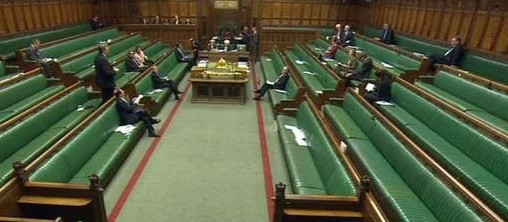Only 21 out of 650 MPs Attend Parliamentary Debate on UK Drug Laws

Only 21 out of a possible 650 MPs turned up to a Parliamentary debate to discuss UK drugs policy following a report suggesting there is no link between tough laws and levels of illegal substance abuse.
The groundbreaking Home Office report, the first time ever the government has highlighted the potential benefits of decriminalising drugs, said there is "no obvious relationship" between imposing penalties for drug taking and levels of drug use after examining polices in other countries.
The report, commissioned by the Liberal Democrat crime prevention minister Norman Baker, caused a rift between the coalition government, with Nick Clegg and David Cameron expressing opposing views on the current drug laws in the UK and the Home Office itself rejecting its findings.
The Commons debate, brought forward by Green Party MP for Brighton Pavilion Caroline Lucas, argued there should be an "evidence-based approach" in the country's drug policies and urged the government to examine "all the alternatives to the UK's failing drug laws".
The debate was triggered after the report looked at how in Portugal, where drug possession has been decriminalised, there has not been a rise in the number of people using drugs. It also notes in the Czech Republic, the country saw worse health outcomes observed, a rise in crime and no evidence of reduced use after drugs were criminalised.
In total, 21 MPs turned up for the debate – four Lib Dems, nine Conservatives, six Labour, one Green and one independent.
I cannot understand why on earth we as a society are putting a thousand people behind bars every year who have only been found to possess drugs for personal use
One of the Tory backbenchers who attended the debate, MP for Poole Robert Syms, said how contrary to press reports: "Many of us on the Conservative benches believe that evidence-based policy would be more effective in dealing with the scourge of drugs."
Addressing Lucas, the former Green Party leader, Conservative MP for Hitchin and Harpenden Peter Lilley added: "I am not sure whether it will cause her or me more embarrassment among our supporters that we find ourselves sharing company and the same side of the argument."
Following the debate, a motion calling for an independent "cost-benefit analysis" of drug laws was approved by MPs. However, this was merely a symbolic and the government is not bound to pass it.
Deputy Prime Minister Clegg earlier spoke out against the government's current stance on drug laws, believing some members of the coalition have a "totally misplaced, outdated, backward-looking view" of the issue.
"This war on drugs is not working. We have got to get away from this facile view that just talking tough solves this problem," he said during his weekly LBC radio phone-in show.
"The evidence shows that a smarter approach where you deal with addicts as people who need treatment so they don't remain hooked on the stuff that is being pushed at them by criminals.
He added: "I cannot understand why on earth we as a society are putting a thousand people behind bars every year who have only been found to possess drugs for personal use. They have done nothing else wrong."
Cameron dismissed suggestions the current drug policy isn't working because the government is following an "evidence-based approach".
He added: "We've been focusing on education, prevention and treatment, and that is the right approach to take.
"I'm a parent with three children; I don't want to send out a message that somehow taking these drugs is okay and safe because, frankly, it isn't."
Both 10 Downing Street and the Home Office categorically ruled out "reckless" calls to decriminalise drugs.
A Home Office spokesperson added: "Our drugs strategy is working and there is a long-term downward trend in drug misuse in the UK.
"It is right that we look at drugs policies in other countries and today's report summarises a number of these international approaches."
© Copyright IBTimes 2025. All rights reserved.






















